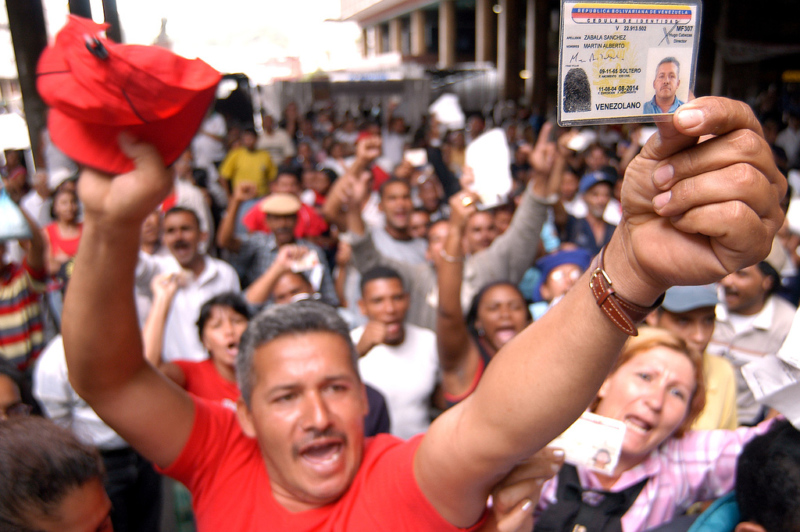One Small Chance for Venezuela
This post is also available in: Español
 Franklin Reyes / Flickr
Franklin Reyes / Flickr
What is most surprising about the Venezuelan opposition’s overwhelming electoral victory on December 6 is that so many people were surprised. In any normal democracy, when a government is responsible for a massive economic recession, runaway inflation, endemic shortages and a collapse of personal safety, voters can be expected to dole out harsh punishment at the ballot boxes.
Venezuela—needless to say—is not a normal democracy. It is a country where checks and balances, military subordination to civilian authority, freedom of the press and the right to dissent have all but vanished. The opposition’s victory is therefore not the ultimate proof of Venezuela’s democratic virtues, as members of the government have argued, but instead an opportunity to rebuild democracy based on tolerance, pluralism, and republican principles, all of which were systematically disdained by chavista governments.
The opposition’s victory is not the ultimate proof of Venezuela’s democratic virtues, but instead an opportunity to rebuild democracy based on tolerance, pluralism, and republican principles.
This opportunity stems from two openings. First, the institutional demolition that former president Hugo Chávez unleashed in 1998 did not extinguish — managing to only threaten — the one unyielding element of democracy: universal and secret voting. This is worth remembering. Despite the less-than-perfect conditions that surround elections in many places, universal and secret voting is still the most powerful instrument ever devised to distribute and control power. It is not, as some on the radical left insist to this day, a bourgeois formality. It is real power, with the capacity to fundamentally alter the trajectory of a country.
Second, this opportunity exists because the opposition — particularly the extraordinary Lilian Tintori — was able to mobilise enormous international support based on an incontrovertible truth: this was the first Latin American election in a long time where the term “political prisoners” was part of the conversation. In demanding electoral transparency, those voices — most notably Luis Almagro, Secretary General of the OAS, and six former Latin American presidents on the ground in Venezuela — were more than enough to compensate for the absence of credible international observers. They were not enough, however, to overcome the shameful silence of those Latin American governments that chose to sacrifice the responsibilities of being a democratic region at the altar of expediency.
Venezuela desperately needs a national consensus to correct its fiscal and monetary imbalances and provide legal assurances for private investment, the only path to sustainable growth. To be a viable option, this consensus should, wherever possible, protect and uphold the network of social services created by chavismo while eliminating the blatant patronage that defines many of its programs today.
Whether or not the election leads to a gradual stabilisation and democratic awakening in Venezuela will depend on both parties. Each side must understand that neither is fully capable of heading off an economic and social collapse alone — a task that should be the absolute priority. Venezuela desperately needs a national consensus to correct its fiscal and monetary imbalances and provide legal assurances for private investment, the only path to sustainable growth. To be a viable option, this consensus should, wherever possible, protect and uphold the network of social services created by chavismo while eliminating the blatant patronage that defines many of its programs today.
For that purpose, it is crucial that President Nicolás Maduro understands that if voters sent one message in this election, it is that chavismo is no longer a majoritarian project, much less a hegemonic one. This pretension — a key aspect of chavista discourse — has been irreparably damaged. For chavismo to again use institutional gimmicks to rob this election of its substance — much like what happened after Chávez lost the 2007 referendum on unlimited re-election or when opposition leader Antonio Ledezma was elected as major of Caracas in 2008 — would be suicidal. The country overwhelmingly rejects the economic consequences of the chavista project, and firmly pins blame for the country’s hardships on the government, and not on the occasional villains invoked by President Maduro.
The opposition, on the other hand, must understand that chavismo will continue to hold the unswerving loyalty of a considerable percentage of Venezuelans. That bloc will occasionally be enough to win elections and, if not, is certainly enough to render the country ungovernable. Any instincts to seek revenge must be abandoned immediately. In particular, this means refraining from attempting an immediate referendum to remove President Maduro from office. Legal obstacles (such as the difficulties of collecting 4m signatures in three days) litter this path and would subject the country to political tensions that the economy is in no position to endure.
If all of this sounds difficult and improbable, that is because it is. Responsible political leadership was an exotic flower in Venezuela long before the rise of Chávez. Sadly, this election will most likely lead to an enormous political collision that may only end with military arbitration. If this happens, Venezuela will be doomed to an economic collapse, a democratic breakdown, and a social explosion much worse than was seen in 1989.
Venezuela is staring into the abyss. It has a small window to change course. While the opportunity to avert disaster is not large, it is still greater than it was before December 6.
Avoiding this fate is the primary responsibility of Venezuelan political leaders. It is also the responsibility of the region’s governments, who would also bear the consequences of such a collapse. If the Latin American governments were not willing to demand respect for cardinal principles of democracy in the past, they can still be atoned by promoting an imperative political dialogue in Venezuela.
Venezuela is staring into the abyss. It has a small window to change course. While the opportunity to avert disaster is not large, it is still greater than it was before December 6.



















